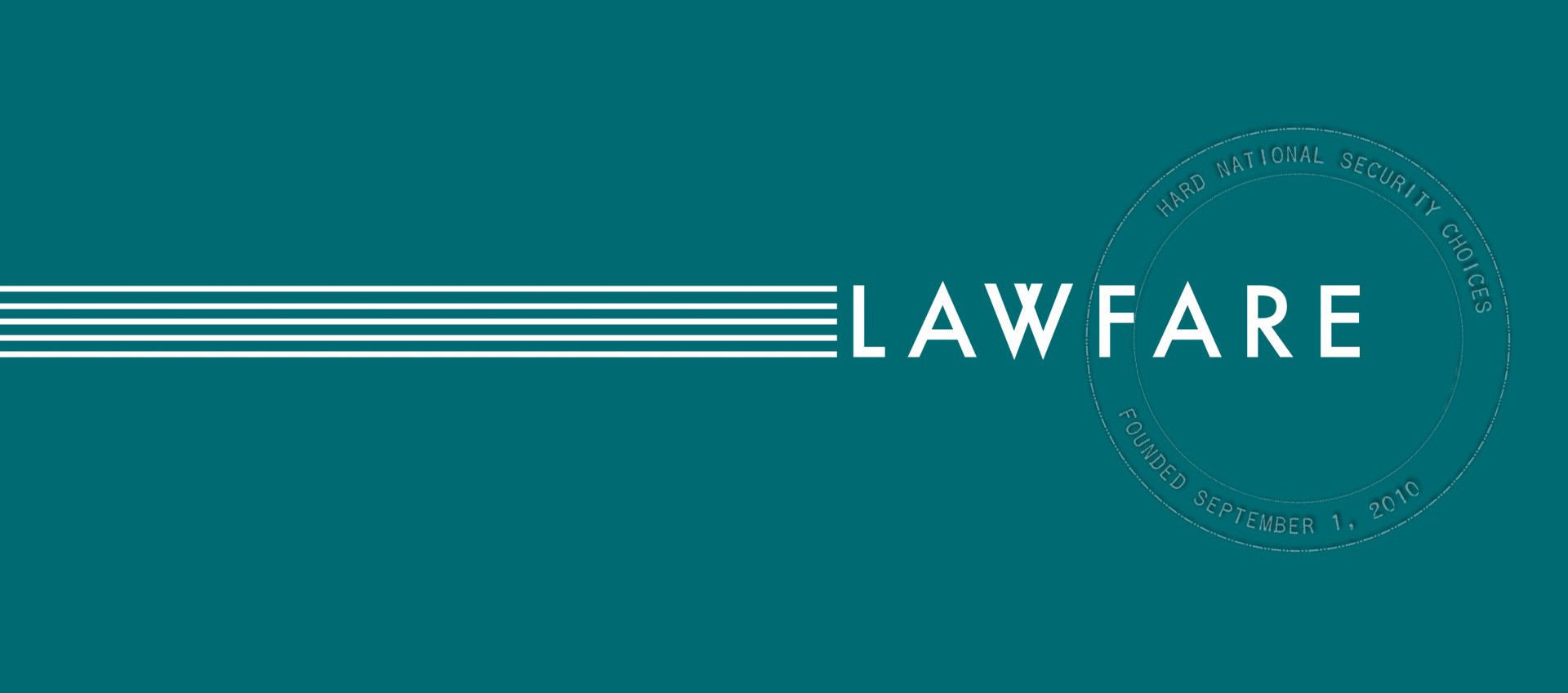The Week That Was: All of Lawfare in One Post
Your weekly summary of everything on the site.

Published by The Lawfare Institute
in Cooperation With

Quinta Jurecic and Benjamin Wittes provided context for former President Donald Trump’s indictment by a New York state grand jury.
Katherine Pompilio shared an order, signed by New York Supreme Court Judge Juan Merchan, authorizing Manhattan District Attorney (DA) Alvin Bragg to publicly disclose the indictment of Trump.
Pompilio shared a letter signed by the Republican chairmen of three House committees imploring DA Bragg to procure documents and testimony pertinent to Trump’s indictment.
Pompilio also shared Bragg’s response to the congressmen’s letter, which asserts that Congress lacks authority to intervene in the indictment.
Wittes considered how first amendment privileges could be applied to protect textual and artistic content generated by large language artificial intelligence (AI) models like Bard and ChatGPT.
For Lawfare’s Digital Social Contract paper series, Ashley Deeks outlined problems facing international regulation of national security AI, and the shortcomings of the nuclear arms-control analogies often implemented to understand these hurdles. She argued that regulation of national security AI is more likely to follow the path set by hostile cyber operations than that of nuclear arms.
Alan Rozenshtein sat down with Deeks on the Lawfare Podcast to discuss her recent Digital Social Contract paper:
Avery Schmitz shared an executive order from President Joe Biden prohibiting U.S. government employees from using commercial spyware that could adversely affect national security interests.
Eugenia Lostri sat down with Winnona DeSombre Bernsen to discuss President Joe Biden’s executive order on commercial spyware, forecast responses by private sector stakeholders, and identify shortcomings with the Biden administration’s policy:
Jim Dempsey considered the efficacy of using external audits as a mechanism for enforcing cybersecurity regulations in the second installment of his three-part series on cybersecurity enforcement. Dempsey identified challenges with conceptualizing a regulatory system reliant on “third-party” reviews and noted how the audits could serve as means of assessment rather than enforcement.
On the Lawfare Podcast, Wittes sat down with Tatyana Bolton and Dave Kleidermacher to discuss Google’s approach to cybersecurity in the context of the so-called Internet of Things:
On the Lawfare Podcast, Jurecic and Rozenshtein sat down with Ravi Iyer to discuss the future of content moderation, strategies for efficiently harnessing technology, and more:
Lostri and Georgia Wood discussed the imperative for international assistance for cyber attacks using case studies from Costa Rica and Vanuatu.
Melissa Stewart weighed a United Nations draft resolution, spearheaded by the Republic of Vanuatu, to consult the International Court of Justice for an advisory opinion concerning states’ obligations to maintain commitments to mitigating climate change.
Chile Eboe-Osuji discussed how foreign sovereign immunity, as defined by a recent International Law Commission report, could affect how wars of aggression are criminalized under international law.
Schmitz shared a letter from Biden notifying Congress that targeted strikes were conducted in eastern Syria against groups with ties to Iran’s Islamic Revolutionary Guard Corps.
In the latest installment of Lawfare’s foreign policy essay series, Madiha Afzal highlighted ambiguities in U.S. policy toward Afghanistan and the need for a clear statement of policy from the Biden administration.
William Byrd outlined the need for a new approach to humanitarian aid in Afghanistan, with a focus on greater utilization of the Afghan private sector enabled by a shift toward cash payments, better implementation of new payment technologies, and improved aid coordination.
Amichai Cohen and Yuval Shany discussed how Israeli President Yitzhak Herzog’s nine-step plan for judicial reform might rectify crises in the country’s supreme court and mitigate widespread political turbulence. Find Cohen and Shany’s series in Lawfare on the proposed reforms here.
Scott R. Anderson sat down with Natan Sachs on the Lawfare Podcast to discuss the most recent developments in Israel’s political crisis. Their conversation is followed by a recording of a recent Brookings panel convened to discuss the crisis featuring Ilana Dayabn, Amos Harel, Sachs, and Shibley Telhami:
On Rational Security, Anderson, Jurecic, and Rozenshtein were joined by Wittes to discuss the week’s big national security news stories, including Israel’s ongoing political crisis regarding Benjamin Netanyahu’s proposed legal reforms, possible action from Joe Biden or Congress to ban TikTok after the Chinese government’s efforts to oppose a forced sale, Donald Trump’s first major campaign rally in Waco, and more:
Manuel Meléndez-Sánchez considered factors contributing to the unusual success of Salvadoran President Nayib Bukele’s war on the country’s criminal gangs, and its worrying implications for human rights in the region.
Rachel Rizzo analyzed the initial months of Italian Prime Minister Giorgia Meloni’s tenure, focusing on her relationship with the right-wing populist Brothers of Italy (Fratelli d’Italia) party, willingness to cooperate with European Union and NATO allies, and controversial stances on various social justice issues.
Julian Ku reviewed Alex Joske’s “Spies and Lies: How China’s Greatest Covert Operations Fooled the World,” an open-source investigation into widespread Chinese influence operations over U.S. business and policymaking elites. He argued that Joske’s findings highlight the need for more rigorous analysis by China experts in order to inform U.S. policymakers.
And on Chatter, David Priess sat down with Målfrid Braut-Hegghammer to discuss her extensive research into Libya and Iraq’s nuclear programs, its implications for the possible proliferation paths of countries today, Norwegian views on nuclear deterrence, and more:
And that was the week that was.



